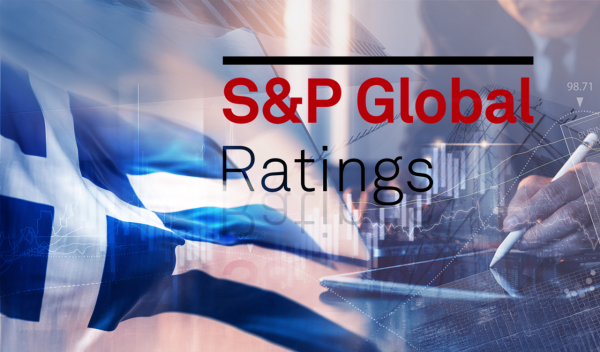
Greek GDP is projected to grow in the following years according to the OECD’s semi-annual Economic Outlook report on the global economy.
More specifically, the organization sees 2.3% growth in 2024, a 2.2% in 2025 and forecasts a 2.5 percentage for 2026. OECD reports that annual inflation remained persistent in Oct. of 2024 at 3.1%, while core inflation stood at 4.3%, driven by rising service costs.
Data reveal that business lending has increased and the decline in mortgage loans has slowed down amidst improvements, although it remains limited. Non-financial businesses gained easier access to loans from Jan. to Sept. 2024; with lending being 54% higher than the same period a year ago.
Interest rates for new loans to households and businesses decreased from 6.2% in Jan. 2024 to 5.4% in Sept.
As for fiscal policies, it is forecasted that they will remain supportive, with disbursements of grants and loans from the Recovery and Resilience Fund projected to increase from 1.8% of GDP in 2024 to 3.6% in 2026.
Regarding the country’s unemployment growth, the OECD report mentions that it is expected to slow down due to rising labor costs. Nominal wages grew by 8.6% in the second quarter of 2024 on an annual basis, as labor shortages remain at historically high levels.
On the other hand, inflation is expected to gradually decline, approaching 2% by 2026, despite persistent increases in service prices and core inflation, which is forecast to drop from 3.7% in 2024 to 3.3% in 2025 and 2.1% in 2026.
The organization estimates that a rimary surplus of around 2.4% of Greek GDP in 2025 and 2026 will contribute to further reducing the country’s public debt to 148.1% of GDP by 2026.
Additionally it predicted that the reduction in social security contributions and pension increases, which were announced by the Greek government, will further support incomes in 2025.
“Maintaining a steady downward trajectory of public debt should remain a priority, as aging-related costs and investment needs will add to future spending pressures,” the OECD states.
Latest News

Alter Ego Ventures Invests in Pioneering Gaming Company ‘Couch Heroes’
Alter Ego Ventures' participation in the share capital of Couch Heroes marks yet another investment by the Alter Ego Media Group in innovative companies with a focus on technology.

Corruption Still Plagues Greece’s Driving Tests
While traffic accidents continue to claim lives on Greek roads daily, irregularities and under-the-table dealings in the training and testing of new drivers remain disturbingly widespread

Pope Francis Died of Stroke and Heart Failure Vatican Confirms
As news of the official cause of death spread, tributes poured in from across the globe. The 1.4 billion-member Catholic Church is united in grief, remembering a pope who championed inclusion, justice, and compassion

Increase in Both Museum Visits, Revenues for 2024
As expected, the Acropolis was the top archeological site in the country, followed by Sounion, Mycenae, the ancient theater of Epidaurus, and Vergina in northern Greece

Where Greece’s Tourists Come From: A Look at 2025’s Top Visitor Markets
The United Kingdom continues to hold the top spot as the largest source of incoming tourism, with 5.6 million seats booked for Greece this summer — up 2.2% from last year. This accounts for 20% of all international air traffic to Greece

Pope Francis: A Pontiff Who Reshaped the Papacy and Sparked a Global Conversation
His first words from the balcony of St. Peter’s Basilica—“Brothers and sisters, good evening”—set the tone for a pontificate that would challenge norms, favor mercy over dogma, and bring the papacy closer to the people.

When Blue Skies was Unmasked as ND’s Political ‘Slush Fund’
The fact that so many top New Democracy (ND) party cadres were paid by the firm Blue Skies, owned by Thomas Varvitsiotis and Yiannis Olympios, without ever citing this publicly, raises very serious moral issues, regardless of the legality

Greek Women’s Water Polo Team Top in the World after 13-9 Win Over Hungary
The Greek team had previously defeated another tournament favorite, the Netherlands, to reach the final.

S&P Raises Greek Rating; BBB with Stable Outlook
S&P’s decision raises the Greek economy to the second notch of investment grade ladder, at BBB with a stable outlook.

Greek Tourism Optimistic About Demand from American Market
A recent survey by MMGY Global, conducted from April 3–5 with a sample of 1,000 U.S. adults, found that 83% of Americans still intend to take leisure trips over the next 12 months, a slight drop from 87% in late February











![Πλημμύρες: Σημειώθηκαν σε επίπεδα ρεκόρ στην Ευρώπη το 2024 [γράφημα]](https://www.ot.gr/wp-content/uploads/2025/04/FLOOD_HUNGRY-90x90.jpg)


![Ξενοδοχεία: Μεγάλο το ενδιαφέρον για επενδύσεις στην Ελλάδα – Η θέση της Αθήνας [γραφήματα]](https://www.ot.gr/wp-content/uploads/2025/03/Athens-hotels-90x90.jpg)


![Airbnb: Πτωτικά κινήθηκε η ζήτηση τον Μάρτιο – Τι δείχνουν τα στοιχεία [γράφημα]](https://www.ot.gr/wp-content/uploads/2024/07/airbnb-gba8e58468_1280-1-90x90.jpg)
























 Αριθμός Πιστοποίησης
Αριθμός Πιστοποίησης